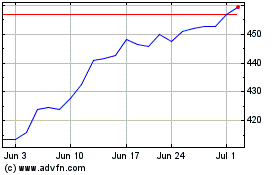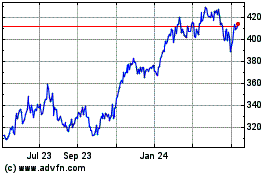By Shira Ovide
For nearly all of Microsoft Corp.'s first 40 years, the company
was defined by two excitable, aggressive bosses: Bill Gates and
Steve Ballmer. The company's current leader, Satya Nadella, in many
ways couldn't be more different.
Mr. Nadella, 48 years old, is more likely to quote German
philosopher Friedrich Nietzschethan to scream and shout like his
predecessors. His mission is markedly different, too: attempting to
make Microsoft more innovative, a change that critics say was long
overdue at a company that tended to fall behind in emerging
technology areas.
Messrs. Gates and Ballmer built a $350 billion software empire
on the popularity of Windows, the personal-computer operating
system that for years was the default interface of office life. Yet
the primacy of Microsoft's Office software--with its built-in
Outlook email, Word for writing documents, and Excel
spreadsheets--is no longer a sure thing. Rival tools for office
tasks have arrived, include file-sharing service Dropbox Inc.,
Apple Inc.'s iPhones, and workplace versions of Google Inc.'s Gmail
and Docs, many of them free.
Thus Mr. Nadella is intent on talking about the evolution of
Office, a program that first started appearing in 1989. These days,
there is the cloud-based subscription variant known as Office 365.
The latest downloadable version of Office, released last week,
adopts features familiar to users of Google Apps for Work, which
allow colleagues to work together on the same document or digital
presentation.
The idea, says Mr. Nadella, is to make Office work seamlessly
with non-Microsoft workplace technologies as well as other
Microsoft.
In an interview, Mr. Nadella proved an unabashed supporter of
the home team, gently prodding a reporter to use Microsoft's
digital note-taking app. The India-born executive also talked of
seeing Microsoft as an outsider, struggling to be a present parent
in the smartphone age, and the importance of nonbusiness
reading.
Edited excerpts:
WSJ: Technologies like Dropbox and GoToMeeting have enabled new
ways of working in the last few years, but few of those
technologies came from Microsoft. What does that mean?
Mr. Nadella: There has always been competition. The only way to
deal with it is to keep innovating, and that's what we do.
WSJ: Consumers are accustomed to apps and browsers getting
updated all the time. And yet we're talking about the next version
of 25-year-old Microsoft Office. Does that seem old-fashioned?
Mr. Nadella: There's nothing old-fashioned about it. The way
Office gets updated if you're an Office 365 subscriber, is just
like going to an app store. It just updates for you. We're very,
very clear we're living in the future, except that we also have a
lot of people who may want [to download and install Office on their
computers].
WSJ: In just a few years, you went from heading
research-and-development for the Bing search engine to becoming CEO
of the company. How did you rise so rapidly?
Mr. Nadella: I don't know I can say I've reflected a lot on what
that journey has meant to me or what lessons can be learned by me
and others. The thing that has helped me the most as I took this
job, though, is the fact that I've worked in a variety of jobs in a
variety of contexts at Microsoft. Some where we already had
achieved a tremendous amount of success, [and some] in places where
we had to struggle through. That combination always helps. Even if
I look at how I think about the leadership team here, people who
have had that kind of experience I think are the ones who are the
most successful.
WSJ: At your first public event as CEO, you said you sought to
see Microsoft as an outsider would. How did you give yourself a
fresh perspective on this company where you've worked for 23
years?
Mr. Nadella: I've always had more of that
insider-who-has-that-outsider sensibility. Insularity mostly breeds
with more success. That's something that I have obviously tried to
do much more consciously as a CEO.
WSJ: You meet every Friday for four hours with your senior
leadership team. Why?
Mr. Nadella: Once a month we have an eight-hour meeting, and the
other three weeks we have a four-hour meeting. The senior
leadership team of any company [has] got to stay on the same page.
Any organization can easily devolve into a bunch of silos.
WSJ: How do you ensure you're getting honest feedback?
Mr. Nadella: Anyone should be able to tell me anything. That's
the culture we strive for. I actively spend a lot of time with my
leadership team, but I also spend a lot of time with the
grass-roots employees. I go visit people in their offices.
Sometimes unannounced...you can ask a few questions and know what's
happening.
WSJ: You have a consuming job, and family is important to you.
What do you do to make time for your family?
Mr. Nadella: First, I must admit that it's a struggle. I think
of it as finding some harmony between work and life. Even if it's
just small things. Like if I take my daughter to a lacrosse game,
how much time am I on the phone versus actually watching her
lacrosse game? I strive for the few moments that I'm doing
something with them that I'm actually present. They appreciate it,
and I appreciate it.
When we had our first son there was a period of time I just
needed to be out because of some medical issues and so on.
Microsoft let me have that time. That perhaps more than anything
else brought the most loyalty from me as a 28- [or] 29-year-old
first-time father. For a person like me who's setting policies now,
I reflect back on it.
The only rule I have is [make] time to actually read outside of
work. Like T.S. Eliot. That I think is the only way to keep
yourself fresh.
Subscribe to WSJ: http://online.wsj.com?mod=djnwires
(END) Dow Jones Newswires
September 29, 2015 16:16 ET (20:16 GMT)
Copyright (c) 2015 Dow Jones & Company, Inc.
Microsoft (NASDAQ:MSFT)
Historical Stock Chart
From Mar 2024 to Apr 2024

Microsoft (NASDAQ:MSFT)
Historical Stock Chart
From Apr 2023 to Apr 2024
